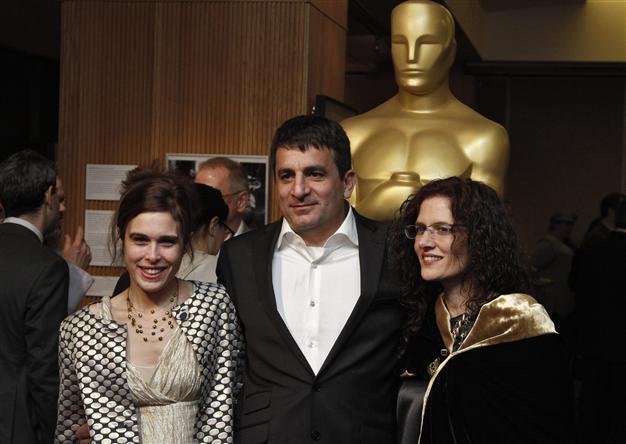Israeli intelligence under spotlight at the Oscars
JERUSALEM - Agence France-Presse

Estelle Fialon (L), Droh Moreh, and Philippa Kowarsky, filmmakers of the Documentary Feature nominee "The Gatekeepers", arrive at Oscar Celebrates. REUTERS Photos
Already under scrutiny over the Prisoner X affair, Israel's all-powerful spy agencies have once again found themselves in the spotlight with the explosive Oscar-nominated documentary "The Gatekeepers".The film, which has been nominated for best documentary, is a French-Israeli production that sheds a harsh and unforgiving light on the operations of Israel's Shin Bet internal security agency through the testimony of six of its former chiefs.
Made with unprecedented candour and a level of introspection which is quintessentially Israeli, it offers a rare glimpse into the world of an intelligence agency accused of being a past master at dirty work.
"This is an important film," said Haaretz columnist Gideon Levy while reproaching its director Dror Moreh for "having made life a little too easy for these guys".
Central to the film is the testimony of six former "gatekeepers" -- Avraham Shalom, who headed Shin Bet from 1980-1986, Yaakov Peri (1988-1994), Carmi Gillon (1994-1996), Ami Ayalon (1996-2000), Avi Dichter (2000-2005) and Yuval Diskin (2005-2011) -- their revelations lifting the lid on three decades of Israel's shadowy "war on terror".
But at the end of their testimony, which is illustrated with archive footage and animated special effects, there is more a sense of pain than of pride.
Despite being considered heroes in Israel, all admit to a sense of failure over the Palestinian question.
The failure is pointedly illustrated by the anecdote of a group of young soldiers who after the 1967 Six Day War announce to Palestinian residents in pidgin Arabic that they have come to "castrate" them -- when what they meant was "list them." It is also evident from their surprise at the outbreak of the first Palestinian intifada on December 9, 1987, which was not foreseen by the Shin Bet despite its repressive apparatus and network of collaborators.
A damning verdict
They also testify to a certain blindness and a sense of impotency in the face of extremist religious Zionism which culminated with the murder of former prime minister Yitzhak Rabin and the subsequent collapse of Israel's peace camp, which has never recovered.
One of the main contributions of Moreh, who has repeatedly warned against the "danger" of the extreme right, is to expose Jewish radicalism -- a phenomenon which is largely unknown to non-Israeli viewers.
"We won all the battles but we lost the war," says Ayalon who was tasked with restoring the agency's reputation following Rabin's murder at a peace rally in Tel Aviv on November 4, 1995.
These men who directed a dirty war without asking questions, admit their work can never bring about a solution to the decades-long Israeli-Palestinian conflict and they lament the political establishment's lack of strategic vision and diplomatic ambition.
Some of their conclusions are dire, like the damning yet shocking verdict of Shalom, who describes the army as a "brutal occupation force, similar to the Germans in World War II." Paradoxically, as they head into retirement, most of these veteran spies have veered away from their former beliefs and turned on their political masters, convinced that the immorality of the occupation does not serve Israel's long-term interests.
Diskin, who stepped down from his role as Shin Bet chief just two years ago, has since ferociously criticised Prime Minister Benjamin Netanyahu for his lack of interest in pursuing a peace agreement with the Palestinians. And he has also waged a bitter campaign against Netanyahu and Defence Minister Ehud Barak, accusing them of "deceiving" Israelis over Iran's nuclear programme.
Similar criticism has been levelled by Meir Dagan, the former head of the Mossad spy agency, and the military's ex-chief of staff, Gaby Ashkenazi.
"When you leave the Shin Bet, you become a bit of a leftie," wryly concludes Peri, who is now an MP with the centrist Yesh Atid faction which is pushing to renew talks with the Palestinians.
















